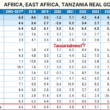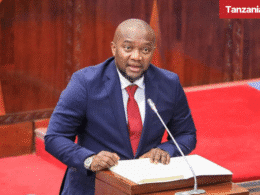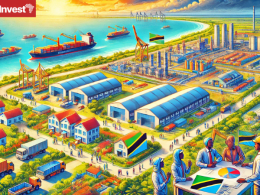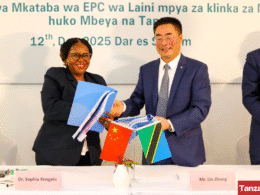TanzaniaInvest conducted an exclusive interview with Dr. Abdallah O. Kigoda, Tanzania Minister for Industry and Trade from 2012 to 2015, to learn about the Tanzania industrial sector, the government development strategy and the investment opportunities available.
TANZANIA INDUSTRIAL SECTOR
TanzaniaInvest: What is the relevance of the industrial sector in Tanzania?
Dr. Abdallah O. Kigoda: Tanzania’s industrial sector still struggles to develop its Manufacturing sector which contributes about 10% of GDP. According to UNIDO 2012 report on Tanzania industrial competitiveness, the country lags behind regional role models both in terms of the quantity and quality of industrial goods produced and exported.
TI: Which are the main impediments to the industrial development of Tanzania?
AK: First and foremost is the low base of the industrial sector itself, in the sense that we haven’t put much emphasis before on basic industries. This has led to the fact that even the contribution of the manufacturing sector itself to GDP has been at around 9% annually.
What we are doing now is to implement the integrated industrial development strategy to develop our basic industries such as coal, iron, gas and oil. This will put us in the position to start with a good base for the basic industries. {xtypo_quote_right}What we are doing now is to implement the integrated industrial development strategy to develop our basic industries such as coal, iron, gas and oil. {/xtypo_quote_right}
It is basically an integrated industrial strategy on three levels. First of all, the heavy industries, secondly value-addition industries – those I mentioned short while ago- but most important is the third level/the SMEs looking at what other major economies did. If you look at Singapore, Malaysia, Thailand all of these concentrated on processing industries or electrical goods or clothing, food etc depending on Small and Medium Scale Enterprises.
There are also other things which really need to be looked at in our industries in order to be more competitive; for instance, the use of high-level technology which is very important for quality products, but most importantly we need to improve some areas of infrastructure.
Firstly, availability of energy. We need to make a lot of efforts to make sure that energy supply is reliable. That is why now the government is doing a lot to try to improve availability of energy in the country.
Another aspect is the lack of innovating financing of the industries. We need to have a Tanzania Industrial Bank sort of institution which would finance specifically the industrial sector.
We have a large expansion of SMEs which contribute about 30% of the industrial production. However, we need to boost up the value addition capacity.{xtypo_quote_left}we need to boost up the value addition capacity{/xtypo_quote_left}
Another area is the road infrastructure. We need to improve the roads and the railways which are vital to industrial development.
If all these areas are looked at closely, it will be possible to improve the performance of manufacturing sector in the country.
TI: Do you think that the recent discovery of natural gas could be the solution to power shortage?
AK: Yes. And that is why we are now involved in a very big project of getting the gas from the southern part of the country to Dar es Salaam; we are laying a gas pipeline from Mtwara to Dar. We are also planning to extend the supply of gas to the northern part of the country, and most probably exporting it to the neighbouring countries. Our goal is to generate 3000MW come 2015.
TI: In relation to financing the industrial sector, isn’t the Tanzania Investment Bank actually undertaking such role?
AK: Yes but it’s not enough. With the establishment of a Tanzania Industrial Bank would be a long-term solution. We cannot depend on commercial banks because they are short term lending oriented.
EXPORT PROCESSING ZONES & INTERNATIONAL TRADE
TI: It is said that the most important contribution of the current Mini-Tiger Plan is the introduction of Special Economic Zones in Tanzania (SEZs) and the plan’s focus on export-led manufacturing growth. What was the need to add these to the Tanzania investmentplans?
AK: We have been trying to create an enabling and conducive environment for investment. As you may know, historically Tanzania was a socialistic economy, so it depended very much on the public sector. As time went by we became aware that public sector alone cannot start the engine of growth.
So we took a number of reforms in the country in the 1980s aimed at ensuring that the private sector becomes the engine of growth. And that’s when we started to establish a number of institutions that would facilitate investments such as the Tanzania Investment Centre (TIC) which deals with all the investors which are coming into the country.
But recently we have started the Economic Processing Zones (EPZ) and now we are having a lot more investors coming into the country.And one of the main things we are looking at is moving away from the slow processes, like the bureaucratic delays and similar issues.
So this has enabled us to register a number of businesses in these Zones from the private sector, from both local and foreign investments.
TI: How would you assess the impact of the Export Processing Zone Authority (EPZA), overseeing these Zones?
AK: I think the EPZA strategy is very promising. We have started a number of industries in a short period of time: clothing textiles, food processing, pharmaceuticals, assembling etc totalling 70 industries in place. And the good thing about it is that we are using the standard best practices used all of over the world: the rules and regulations applied worldwide.
The Export Processing Zone strategy is very promising. We have started a number of industries in a short period of time: clothing textiles, food processing, pharmaceuticals, assembling etc totalling 70 industries in place
So I think it has given us a win-win situation as far as attracting industries to our economy is concerned.
One of the things which investors do appreciate about EPZA is the timeliness of decision making because MIT is the one who oversees all EPZA activities so we really don’t waste any time when we see investors coming.
Also, at the same time we thought of creating Special Economic Zones (SEZ) because in EPZA 80% is for export and 20% is for local.
So I think the solution is getting away from bureaucracy and reducing the costs of doing business in the country.
TI: And how do you reduce the cost of doing business in Tanzania?
AK: A lot emphasis now is on assuring that we get enough energy, improving our road and railway transportation systems, but most importantly reducing time of registration and start-up of the business.
A challenging area here isthe port infrastructure: the Dar and Tanga ports.
If you take a closer look, it all comes to a matter of timeliness, of efficiency of operations.
Another area we are fighting against every day is the issue of corruption; it is the biggest poison for as far as private investment is concerned.Of course a number of institutions have been opened in the country such as TIC, EPZA so now investors know where to go before starting their activities.
Also, we have put into place the Private -Public Partnership Act. Private investors can now join hands with the government. So these are some of the measures we have taken to reduce the cost of doing business.
FOREIGN DIRECT INVESTMENTS
TI: What would be your personal welcoming message to international investors?
AK: There is no country which can develop in isolation. Given the globalisation, the liberalised markets and the different economic situations which affect us globally the importance of FDI needs not to be underestimated.
However, it has to be directed to those areas where it would act as catalyst for further development in our economy. If you get FDI for infrastructure development or for rural energy or for improving water supply that would mean something.{xtypo_quote_left}the future is bright. We want to become a semi-industrialized country by 2025{/xtypo_quote_left}
I think it is important to target those areas which really would increase employment, income for the people; especially in value-addition. For instance agribusiness: if our cotton is processed here, up to the level of making clothes, that is value addition. When we are exporting raw cotton we are not only exporting material, we are also exporting employment. And when that cotton is brought back to us as finished product we even have to pay an extra price for it.
At the same time, the global economic crisis is dragging more and more the attention on Africa because of the potential of resources it offers. So with FDI there would be a win-win situation which would improve technology here, would increase employment, wouldlead to growth of people’s incomes. That has to be welcomed.
TI: Out of all the African countries, why Tanzania?
AK: First and foremost Tanzania is the most peaceful country in Africa. It’s politically stable.
Secondly, we have a number of areas, we have the potential, we have the resources.There must be a reason why China, Korea, Japan, other European countries and even US are already coming to Tanzania.
And now we are also trying to unite our economic and trade organisations like the East African Community (EAC), the SADC, and the COMESA. It means there will be a huge market coming up, with Dar Es Salaam being the main gateway to these areas.
TI: How do you see the future of Tanzania?
AK: I think the future is bright. We want to become a semi-industrialized country by 2025, we have to concentrate on industries, we want to change the economic make-up of depending mainly on agriculture and to be industrial-led. And for all this, the economic integrated industrial strategy is in place.
To download the free Tanzania Industrial Competiveness Report follow the link: http://tanzaniainvest.com/downloads/Tanzania-Industrial-Competitiveness-Report2012-UNIDO.pdf











